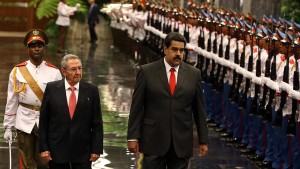Carlos Sánchez Berzaín
June 27, 2018
 (Interamerican Institute for Democracy) The regimes from Cuba, Venezuela, Nicaragua, Bolivia and Ecuador under Correa’s presidency, replaced politics with criminal practices in order to totally and indefinitely control political power. This reveals an expansion and updating of Cuba’s Castroist social control methodology that is seen in concrete facts. Although it is not the only illicit practice, extortion is a key feature of the Castroist Chavist methods in this 21stCentury that is further proof of the Transnational Organized Crime’s nature of these dictatorships.
(Interamerican Institute for Democracy) The regimes from Cuba, Venezuela, Nicaragua, Bolivia and Ecuador under Correa’s presidency, replaced politics with criminal practices in order to totally and indefinitely control political power. This reveals an expansion and updating of Cuba’s Castroist social control methodology that is seen in concrete facts. Although it is not the only illicit practice, extortion is a key feature of the Castroist Chavist methods in this 21stCentury that is further proof of the Transnational Organized Crime’s nature of these dictatorships.
Extortion is “the pressure exerted on someone -through threats- to compel him/her to act in a certain way and obtain a monetary or other type of benefit”. The legal definition of extortion includes “the intimidation or serious threat that restricts a person to do, tolerate the doing or not doing of something for the purpose of deriving a benefit or undue advantage for one’s self or someone else.”
To threaten is “to make it understood through acts or words that harm can befall someone”. To intimidate is “to cause or arouse someone to have fear, to inhibit”, with the intent that this is to prevent, or repress someone from exercising his personal faculties or rights. It is about instilling fear and the Castroist Chavist methodology does this “legally” through judicial rulings and mandates that range from the content of their “pseudo constitutions”, their despicable laws, and the aggregate of directives and institutions they have created and exist with the objective of making extortion the “legal mechanism” of oppression.
The absolute absence of the “Rule of Law”, the disappearance of the “separation and independence of the branches of government”, are the framework for the use of extortion as a method and means of control. This way, the threat and intimidation in Castro’s Cuba, Chavez and Maduro’s Venezuela, Ortegas’ Nicaragua, Evo Morales’ Bolivia, and Correa’s Ecuador, functions under the direction of the regime that places its administrative and judicial apparatus with which if the victim does not do or stops doing what the regime wants, imprisonment, prosecution, torture, and the assassination of the victim’s reputation follow. All of these done with the regime’s control of the press, seizure of assets, misery, ruin, exile or even the victim’s death.
Extortion is applied to politicians in order to get their docility or to neutralize them. It is dramatic to see how members of the opposition end up working for the regime and act within the framework or cage of limitations imposed upon them by the dictatorships who alternatively to threatening them can reward them with positions and riches with which it can extort them again afterwards. The Castroist Chavist constitutions have established “the law’s retroactivity” and have suppressed or limited parliamentary immunities in order to keep extorting members of the opposition. Hundreds of cases such as; Leopoldo Lopez’s in Venezuela and that of his wife Lilian Tintori, trials against former presidents (some already retired) and former Ministers from Bolivia, and members of the opposition in Nicaragua are proof.
Judges, prosecutors, and even attorneys are also extorted. Several cases corroborate this, cases, such as; Venezuela’s Judge Maria Lourdes Afiuni’s jailing, violations, and tortures; the fired prosecutors and judges who were, afterwards, prosecuted in the case of Magistrate Gualberto Cusi in Bolivia, as well as the jailing of defense attorneys; the persecution and exile of Magistrates from Venezuela’s Supreme Justice Tribunal “the legitimate one in exile”, or that of Attorney General Ortega, the assassination of Prosecutor Alberto Nisman in Kirchner’s Argentina, and dozens more.
The imprisonment, torture, humiliations, assassinations, and exile started as extortions and are dictatorial warning operations in order to ensure the submission of the system it manipulates “setting precedents” of its decision to use extortion to obtain benefits for the dictator and his Organized Crime’s group who is called government, benefits that can range from financial gain, cover up, and impunity, up to the indefinite tenure in government.
No one is free from the government’s extortion in Castroist Chavist dictatorships. The judicial system, the police, the Internal Revenue Service’s offices, the Labor Department, the Public Administration Service, the Health Department, the Education Department, are all means to extort and subject citizens under the will of the regime. In Cuba, those who “succeed on their own” are closed down and are jailed, in Venezuela and Ecuador important communications’ channels were seized and/or forcibly sold to be placed at the service of the regime, in Bolivia journalists are fired under threats from the government, in Nicaragua many assassinations go unpunished. These are countries wherein many citizens can give their testimony of how and how often they were “pressured” with.
Translated from Spanish by Edgar L. Terrazas, member of the American Translators’ Association, ATA # 234680.
Published in Spanish by Diario las Américas and Infobae.com on Sunday June 24th, 2018
 Carlos Sanchez Berzain Abogado | Estadista | Político | Politólogo
Carlos Sanchez Berzain Abogado | Estadista | Político | Politólogo